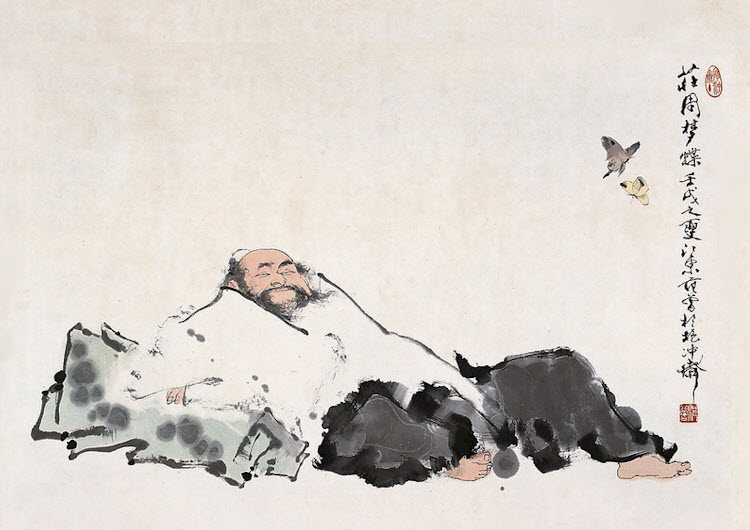924
Lectures Watched
Since January 1, 2014
Since January 1, 2014
- A History of the World since 1300 (68)
- History of Rock, 1970-Present (50)
- A Brief History of Humankind (48)
- Chinese Thought: Ancient Wisdom Meets Modern Science (35)
- The Modern World: Global History since 1760 (35)
- The Bible's Prehistory, Purpose, and Political Future (28)
- Introduction aux éthiques philosophiques (27)
- Jesus in Scripture and Tradition (25)
- Roman Architecture (25)
- Sexing the Canvas: Art and Gender (23)
- Descubriendo la pintura europea de 1400 a 1800 (22)
- Introduction aux droits de l'homme (19)
- Buddhism and Modern Psychology (18)
- Calvin: Histoire et réception d'une Réforme (17)
- The Ancient Greeks (16)
- À la découverte du théâtre classique français (15)
- The French Revolution (15)
- Letters of the Apostle Paul (14)
- Key Constitutional Concepts and Supreme Court Cases (14)
- Christianisme et philosophie dans l'Antiquité (14)
- Egiptología (12)
- Western Music History through Performance (10)
- The Rise of Superheroes and Their Impact On Pop Culture (9)
- The Great War and Modern Philosophy (9)
- Alexander the Great (9)
- Greek and Roman Mythology (9)
- Human Evolution: Past and Future (9)
- Phenomenology and the Conscious Mind (9)
- Masterpieces of World Literature (8)
- Villes africaines: la planification urbaine (8)
- Greeks at War: Homer at Troy (7)
- Pensamiento Científico (7)
- MongoDB for Node.js Developers (7)
- Fundamentos de la escritura en español (7)
- Introduction to Psychology (7)
- Programming Mobile Applications for Android (7)
- The Rooseveltian Century (6)
- Karl der Große - Pater Europae (6)
- Fake News, Facts, and Alternative Facts (6)
- Reason and Persuasion Through Plato's Dialogues (6)
- The Emergence of the Modern Middle East (6)
- A Beginner's Guide to Irrational Behavior (6)
- Lingua e cultura italiana: avanzata (6)
- L'avenir de la décision : connaître et agir en complexité (5)
- Understanding Einstein: The Special Theory of Relativity (5)
- Dinosaur Paleobiology (5)
- Exploring Beethoven's Piano Sonatas (5)
- War for the Greater Middle East (4)
- Emergence of Life (4)
- Introduction to Public Speaking (4)
- The Kennedy Half Century (4)
- Problèmes métaphysiques à l'épreuve de la politique, 1943-1968 (4)
- Designing Cities (4)
- Western Civilization: Ancient and Medieval Europe (3)
- Paleontology: Early Vertebrate Evolution (3)
- Orientierung Geschichte (3)
- Moons of Our Solar System (3)
- Introduction à la philosophie de Friedrich Nietzsche (3)
- Devenir entrepreneur du changement (3)
- La Commedia di Dante (3)
- History of Rock and Roll, Part One (3)
- Formation of the Universe, Solar System, Earth and Life (3)
- Initiation à la programmation en Java (3)
- La visione del mondo della Relatività e della Meccanica Quantistica (3)
- The Music of the Beatles (3)
- Analyzing the Universe (3)
- Découvrir l'anthropologie (3)
- Postwar Abstract Painting (3)
- The Science of Religion (2)
- La Philanthropie : Comprendre et Agir (2)
- Highlights of Modern Astronomy (2)
- Materials Science: 10 Things Every Engineer Should Know (2)
- The Changing Landscape of Ancient Rome (2)
- Lingua e letteratura in italiano (2)
- Gestion des aires protégées en Afrique (2)
- Géopolitique de l'Europe (2)
- Introduction à la programmation en C++ (2)
- Découvrir la science politique (2)
- Our Earth: Its Climate, History, and Processes (2)
- The European Discovery of China (2)
- Understanding Russians: Contexts of Intercultural Communication (2)
- Philosophy and the Sciences (2)
- Søren Kierkegaard: Subjectivity, Irony and the Crisis of Modernity (2)
- The Fall and Rise of Jerusalem (2)
- The Science of Gastronomy (2)
- Galaxies and Cosmology (2)
- Introduction to Classical Music (2)
- Art History for Artists, Animators and Gamers (2)
- L'art des structures 1 : Câbles et arcs (2)
- Russian History: from Lenin to Putin (2)
- The World of Wine (1)
- Wine Tasting: Sensory Techniques for Wine Analysis (1)
- William Wordsworth: Poetry, People and Place (1)
- The Talmud: A Methodological Introduction (1)
- Switzerland in Europe (1)
- The World of the String Quartet (1)
- Igor Stravinsky’s The Rite of Spring (1)
- El Mediterráneo del Renacimiento a la Ilustración (1)
- Science of Exercise (1)
- Социокультурные аспекты социальной робототехники (1)
- Russian History: from Lenin to Putin (1)
- The Rise of China (1)
- The Renaissance and Baroque City (1)
- Visualizing Postwar Tokyo (1)
- In the Night Sky: Orion (1)
- Oriental Beliefs: Between Reason and Traditions (1)
- The Biology of Music (1)
- Mountains 101 (1)
- Moral Foundations of Politics (1)
- Mobilité et urbanisme (1)
- Introduction to Mathematical Thinking (1)
- Making Sense of News (1)
- Magic in the Middle Ages (1)
- Introduction to Italian Opera (1)
- Intellectual Humility (1)
- The Computing Technology Inside Your Smartphone (1)
- Human Origins (1)
- Miracles of Human Language (1)
- From Goddard to Apollo: The History of Rockets (1)
- Hans Christian Andersen’s Fairy Tales (1)
- Handel’s Messiah and Baroque Oratorio (1)
- Theater and Globalization (1)
- Gestion et Politique de l'eau (1)
- Une introduction à la géographicité (1)
- Frontières en tous genres (1)
- Créer et développer une startup technologique (1)
- Découvrir le marketing (1)
- Escribir para Convencer (1)
- Anthropology of Current World Issues (1)
- Poetry in America: Whitman (1)
- Introducción a la genética y la evolución (1)
- Shakespeare: On the Page and in Performance (1)
- The Civil War and Reconstruction (1)
- Dinosaur Ecosystems (1)
- Développement durable (1)
- Vital Signs: Understanding What the Body Is Telling Us (1)
- Imagining Other Earths (1)
- Learning How to Learn (1)
- Miracles of Human Language: An Introduction to Linguistics (1)
- Web Intelligence and Big Data (1)
- Andy Warhol (1)
- Understanding the Brain: The Neurobiology of Everyday Life (1)
- Practicing Tolerance in a Religious Society (1)
- Subsistence Marketplaces (1)
- Physique générale - mécanique (1)
- Exercise Physiology: Understanding the Athlete Within (1)
- Introduction to Mathematical Philosophy (1)
- What Managers Can Learn from Great Philosophers (1)
- A la recherche du Grand Paris (1)
- The New Nordic Diet (1)
- A New History for a New China, 1700-2000 (1)
- The Magna Carta and its Legacy (1)
- The Age of Jefferson (1)
- History and Future of Higher Education (1)
- Éléments de Géomatique (1)
- 21st Century American Foreign Policy (1)
- The Law of the European Union (1)
- Design: Creation of Artifacts in Society (1)
- Introduction to Data Science (1)
- Configuring the World (1)
- From the Big Bang to Dark Energy (1)
- Animal Behaviour (1)
- Programming Mobile Services for Android Handheld Systems (1)
- The American South: Its Stories, Music, and Art (1)
- Care of Elders with Alzheimer's Disease (1)
- Contagious: How Things Catch On (1)
- Constitutional Law - The Structure of Government (1)
- Narratives of Nonviolence in the American Civil Rights Movement (1)
- Christianity: From Persecuted Faith to Global Religion (200-1650) (1)
- Age of Cathedrals (1)
- Controversies of British Imperialism (1)
- Big History: From the Big Bang until Today (1)
- Bemerkenswerte Menschen (1)
- The Art of Poetry (1)
- Superpowers of the Ancient World: the Near East (1)
- America Through Foreign Eyes (1)
- Advertising and Society (1)
Hundreds of free, self-paced university courses available:
my recommendations here
my recommendations here
Peruse my collection of 275
influential people of the past.
influential people of the past.
View My Class Notes via:
Receive My Class Notes via E-Mail:
Contact Me via E-Mail:
edward [at] tanguay.info
Notes on video lecture:
The Guodian Laozi
Notes taken by Edward Tanguay on February 2, 2017 (go to class or lectures)
Choose from these words to fill the blanks below:
Odes, utopias, webbed, crossword, China, de, sageliness, nature, trope, detailed, wisdom, archeologists, Zhuangzi, random, hooves, 20th, Rites, Daodejing, anti, Guodian, grave, sick, bronze, tombs, 1993, 300, Chu, written, Daoism, 1998
•
archeological texts
•
some are versions of the
•
texts that we have uncovered in their original form
•
most written on bamboo with ink
•
some are silk text
•
Mawangdui, central China
•
manuscript on silk, 2nd century BC
•
some on paper where caves are particularly dry
•
Dunhuang
•
typically these come from
•
debate on what the relationship was between the text and the person who died, perhaps
•
they liked these texts
•
used these texts professional
•
they were thought to be important to them in the after-life
•
archeologists like archeological texts because they are the best of both words in terms of reliability and accuracy
•
received
•
examples
•
First Song of the Book of
•
advantages
•
longer
•
give you more information
•
disadvantages
•
don't know when they were written
•
don't know when they were copied
•
tend to be elite texts
•
archeological
•
advantages
•
we can date them
•
some vessels have a date on them
•
not changed, direct communication
•
combine informational richness with historical reliability
•
are often everyday texts, not from the elite or studied class necessarily
•
disadvantages
•
short
•
don't give us too much information
•
since the beginning of the century, we are finding more and more
•
they revolutionized our understanding of early
•
legal texts
•
a judge who was buried with his complete court cases
•
can be quite dry topics to read, e.g. some guy stole a chicken, what do we do
•
but for historians, it's gold
•
it gives you accurate and information
•
both the legal system of early China
•
the daily lives of people
•
simpler texts
•
farmer's almanacs
•
day books
•
people trying to figure out why they are getting
•
a more accurate picture of everyday life on the ground
•
new philosophical and religious texts
•
the Laozi
•
unearthed in Guodian (Hubei) in
•
near the former capital
•
one of the southernmost Warring States
•
tomb was sealed in about BCE
•
so we know these texts have not been changed since then
•
bamboo strips
•
water had entered the tomb
•
strips covered with mud
•
different length
•
the strings that held them together had degenerated
•
had to put them together
•
beveled the same way
•
the same length
•
string marks
•
line them up
•
handwriting is similar
•
conceptually which go together
•
like a jigsaw and puzzle
•
written in Chu script
•
diversity of pre-standardization script styles
•
every state had their own script styles
•
types of texts
•
philosophical and religious
•
copies of received texts
•
Dao De Jing
•
a chapter of the Liji, or Book of
•
copies of texts that we know about, that were listed in bibliographies but were lost
•
Wu xing (Five Types of Conduct)
•
new texts we had never heard of
•
seem to represent a lost school of Confucianism
•
Guodian Daodejing
•
three bundles
•
different handwriting and sizes
•
Laozi A
•
Laozi B
•
Laozi C, Taiyi Shengshui
•
creation story
•
doesn't correspond to anything in the received Daodejing
•
published in
•
still debated who these documents relate to each other
•
order
•
partial chapters
•
the Daodejing was probably a kind of central text which people could mix and match
•
texts were fluid
•
using different parts of text for different purposes
•
wording is different
•
received version:
•
"Cut off , abandon wisdom, and the people will benefit one hundred fold. Cut off benevolence, abandon righteousness, and the people will return to being filial and kind. Cut off cleverness, abandon profit, and robbers and thieves will be no more."
•
get rid of explicit morality and Confucianism
•
a clear -Confucian slant to this passage
•
Guodian version:
•
"Cut off , abandon distinctions, and the people will benefit one hundred fold. Cut off cleverness, abandon profit, and the people will return to being filial and kind. Cut off artifice, abandon reflection, and robbers and thieves will be no more."
•
no mention of Confucianist terminology
•
there is no doubt that there were differences between and Confucianism in the Warring States period
•
the Daodejing is picking metaphors which are explicitly against metaphors in the Analects
•
the concepts are different
•
the concept of is almost the opposite
•
this divide probably gets more pronounced later in Chinese history
•
Warring States period
•
a ramping up of these differences
•
clearly in place by this time was the "primitivist", chapters 8-10
•
different from the inner chapters
•
represent a primitivist school that looks a lot like the Daodejing school
•
but were produced at the end of the Warring States
•
talk about where there is no morality or technology
•
toes
•
horrible things that Confucianism does to warp our nature
•
horses
•
people who put horse shoes on horses
•
potters
•
people who mutilate
•
Robber Chih
•
echoes passages from the Daodejing
•
put them in an anti-Confucian context
•
Confucians as robbers
•
the anti-Confucian gets emphasized at the end of the Warring States
Ideas and Concepts:
Strangely reminds me of my boyhood home in Colorado, via this morning's Ancient Chinese philosophy class: "These rammed earth ruins of a granary in Hecang Fortress, located 11 kilometers northeast of the Western-Han-era Yumen Pass, near the Great Wall of China in the Gansu Province, were built during the Western Han (202 BC - 9 AD) and significantly rebuilt during the Western Jin (280-316 AD). This was an area through which the Silk Road passed, and was the one road connecting Central Asia and China."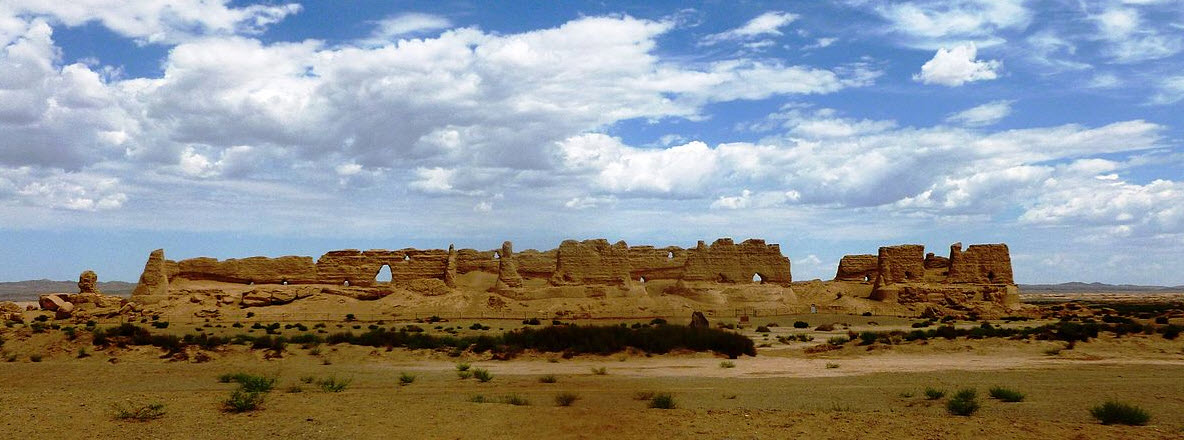
Wisdom of the Liji, or The Book of Rites, from the Zhou Dynasty (1046-256 BC), via this evening's Ancient Chinese Philosophy class: "Accumulate wealth but be able to part with it. Rest in what gives you satisfaction and yet be able to seek satisfaction elsewhere. When you find wealth within your reach, do not attain it by improper means. When you meet with calamity, do not escape from it by improper means. Do not seek for victory in small contentions. Do not seek for more than your proper share. Do not positively affirm what you have doubts about."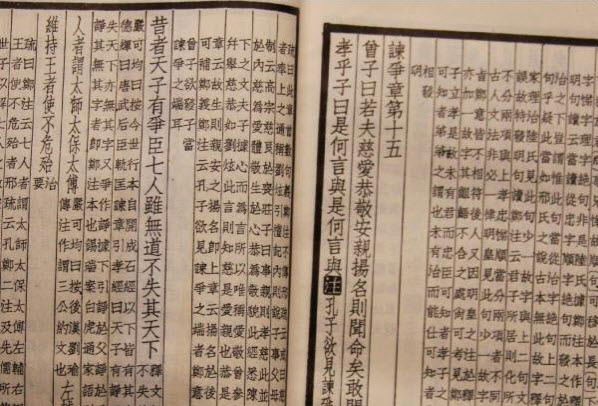
Ancient conceptual scheme via tonight's Chinese Philosophy class:
"The Wu Xing is a system of five phases used for describing interactions and relationships between phenomena. After it came to maturity in the first century BCE during the Han dynasty, this device was employed in many fields of early Chinese thought, including seemingly disparate fields such as geomancy (the art of placing or arranging buildings or other sites), Feng shui (philosophical system of harmonizing people and things with the surrounding environment), astrology, medicine, music, military strategy, and martial arts.
The generating relationships between the five phases are:Wood feeds Fire, Fire creates Earth (ash), Earth bears Metal, Metal collects Water, and Water nourishes Wood.
The overcoming relationships are:Wood parts Earth (tree roots), Earth dams Water, Water extinguishes Fire, Fire melts Metal, and Metal chops Wood."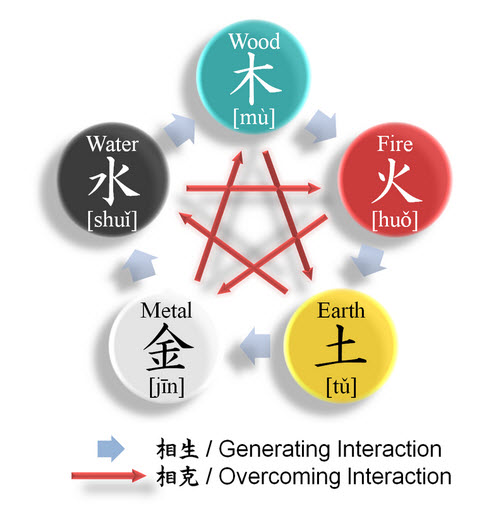
"The Wu Xing is a system of five phases used for describing interactions and relationships between phenomena. After it came to maturity in the first century BCE during the Han dynasty, this device was employed in many fields of early Chinese thought, including seemingly disparate fields such as geomancy (the art of placing or arranging buildings or other sites), Feng shui (philosophical system of harmonizing people and things with the surrounding environment), astrology, medicine, music, military strategy, and martial arts.
The generating relationships between the five phases are:Wood feeds Fire, Fire creates Earth (ash), Earth bears Metal, Metal collects Water, and Water nourishes Wood.
The overcoming relationships are:Wood parts Earth (tree roots), Earth dams Water, Water extinguishes Fire, Fire melts Metal, and Metal chops Wood."
Creation myth emphasizing cooperation, via this morning's Ancient Chinese philosophy class:
"The Taiyi Shengshui was written about 300 BCE during the Warring States period. It was discovered in 1993 in Hubei, Jingmen and is part of the Guodian Chu Slips, the Taiyi Shengshui being was written on 14 bamboo strips in the Chu script.
The Great One gave birth to Water,
and Water returned and assisted the Great One, in this way developing Heaven. Heaven returned and assisted the Great One, in this way developing the Earth. Heaven and earth assisted each other, and in this way developed the Above and Below.
The Above and Below assisted each other,and in this way developed the Yin and Yang. Yin and Yang assisted each other, and in this way developed the Four Seasons. The Four Seasons assisted each other, and in this way created Cold and Hot. Cold and Hot assisted each other, and developed Moist and Dry. Moist and dry assisted each other, and developed the Circle of the Year, and the process came to an end."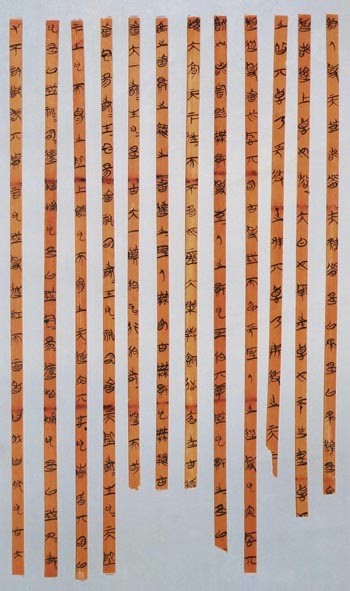
"The Taiyi Shengshui was written about 300 BCE during the Warring States period. It was discovered in 1993 in Hubei, Jingmen and is part of the Guodian Chu Slips, the Taiyi Shengshui being was written on 14 bamboo strips in the Chu script.
The Great One gave birth to Water,
and Water returned and assisted the Great One, in this way developing Heaven. Heaven returned and assisted the Great One, in this way developing the Earth. Heaven and earth assisted each other, and in this way developed the Above and Below.
The Above and Below assisted each other,and in this way developed the Yin and Yang. Yin and Yang assisted each other, and in this way developed the Four Seasons. The Four Seasons assisted each other, and in this way created Cold and Hot. Cold and Hot assisted each other, and developed Moist and Dry. Moist and dry assisted each other, and developed the Circle of the Year, and the process came to an end."
Fifth century BCE phenomenological insights, via chapter 2 of the Zhuangzi and this evening's Ancient Chinese philosophy class: "Once, Zhuang Zhou dreamed he was a butterfly, a butterfly flitting and fluttering about, happy with himself and doing as he pleased. He didn't know that he was Zhuang Zhou. Suddenly he woke up and there he was, solid and unmistakable Zhuang Zhou. But he didn't know if he was Zhuang Zhou who had dreamt he was a butterfly, or a butterfly dreaming that he was Zhuang Zhou. Between Zhuang Zhou and the butterfly there must be some distinction. This is called the Transformation of Things."